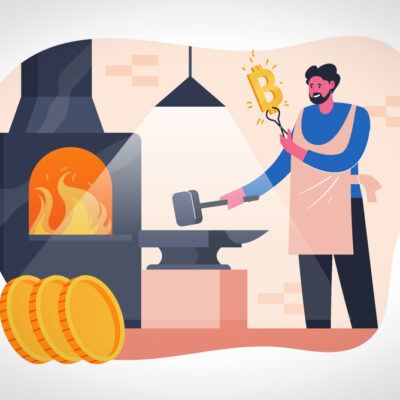
To be perfectly honest, the best way to invest in bitcoin is to hold it directly in cold storage. Simply buying bitcoin and stacking it into cold storage is simple, profitable, and gives you all the benefits of bitcoin as a permissionless, censorship-resistant digital money. There really aren’t a whole lot of reasons to venture outside of this standard procedure.
That being said, you can take advantage of bitcoin’s price action in a number of ways outside of just holding bitcoin the asset. One way is to invest in bitcoin mining, but there are actually a number of way to do this, each with their own benefits and drawbacks.
As I see it, there are four ways to invest in bitcoin mining for the average bitcoiner:
- buy bitcoin miner stocks
- buy ASICs and host them
- buy hashpower to earn bitcoin
- buy ASICs and mine at home
Investing in bitcoin mining comes with its own complexities and risks. The main thing to consider is that with most of the options listed (with the exception of #3), you run the risk of actually losing money.
When you buy and hold bitcoin, you still have the bitcoin. The price may go up and down, but you still hold the asset. When you invest in miners, there is the possibility that your investment ends up as a total loss. A miner could go bankrupt. A hosting facility could rug you. Components on your ASIC could break beyond repair.
How To Invest In Bitcoin Mining
[move, edit] One of the main reasons to invest in bitcoin mining is simply enhanced profitability when compared to bitcoin. Bitcoin miners often outperform bitcoin’s returns during bull markets making them an attractive investment at times.
Another reason to invest in bitcoin miners is that their price is directly correlated with the price of bitcoin, but they can be easily held in a standard brokerage account. This means bitcoin miners are popular investments for bitcoiners with 401(k)s, IRAs, and other tax-advantaged investment vehicles. Bitcoin popping 100% or 300% becomes a lot more attractive when you can take profits tax-free!
However, investing in bitcoin mining comes with its own set of complications and nuances.
The number one thing to consider is that a bitcoin miner can go bankrupt. Unlike bitcoin, which is very unlikely to simply go to zero, it’s actually very likely that many today’s bitcoin mining companies will go bankrupt at some point. Such is the nature of an emerging landscape of highly competitive businesses. So while you may be squeeze out a few extra percentage points gains from a bitcoin miner, you also take on a risk profile that’s different from bitcoin.
Not only that, investing in companies is not a simple undertaking, and bitcoin in stocks is a different decision-making process. While the mechanics of buying stock is super easy and not that different from buying bitcoin, actually understanding if buying shares in bitcoin company is good idea takes a lot of due diligence.
If you are considering investing in bitcoin mining, simply picking a miner with a lot of ASICs and cheap electricity costs doesn’t guarantee success. There’s a lot happening behind the scenes with the management team, the regulatory environment in which they operate, and the execution on the ground. If you aren’t reading quarterly reports, listening to earnings calls, you probably aren’t doing enough due diligence.
If I’ve sufficiently scared you off of investing in bitcoin mining, then you may want to read up on bitcoin investing for beginners to get your first bitcoin and secure it into cold storage. Owning bitcoin should be good enough for 99% of buyers.
That being said, I own some bitcoin mining company stocks in my IRA, so I understand the appeal.
1. Invest In Individual Bitcoin Mining Companies
There are quite a few more bitcoin mining companies available on public stock exchanges than I original imagined. I’ve listed everything I could find below, in no particular order. Some of these companies are quite large, while others are quite small. For example, Riot mined between 400-500 bitcoin during the summer months of 2023, while Stronghold mined only about 250 bitcoin in July 2023.
Even looking at those numbers, it doesn’t tell you the cost of electricity, the amount of debt each company has on their balance sheet, and their plans for expansion.
- TeraWulf
- Iris Energy
- Cleanspark
- DMG Blockchain
- Bitfarms
- Canaan
- Hut 8
- SATO Technologies
- BIT Mining Limited
- Stronghold Digital Mining
- Riot Platforms
- Marathon Digital
- Neptune Digital
- Cipher Mining
- Ault Alliance
- HIVE Blockchain
- Argo Blockchain
- Bit Digital
- Greenidge Generation Holdings
- Core Scientific
While I don’t want to turn this into a guide on how to successfully invest in bitcoin miners, I do want to give you an idea about the complexity of investing in bitcoin miners.
For example, this article claims that Riot Platforms “break even price” for bitcoin mining would be at around $89,000 bitcoin, and that they are currently losing money. It also claims that Riot is able to do this not by raising debt, but my diluting shareholders and offering more shares of their stock.
Stronghold Digital, on the other hand, took on a bunch of debt during the 2021 bull run, and now has to return a bunch of their ASICs to NYDIG to pay off their debt now that the bitcoin price is under 50% of its ATH.
Then you have Stronghold mining with waste coal in Pennsylvania, while CleanSpark mines with 95% green power, including nuclear, hydro, and solar. Even so, they remain unprofitable
Each one of these stocks will behave differently due to their different mining and business strategies. For example, Riot’s stock has almost tripled in 2023. CleanSpark has doubled. Stronghold is up a mere 20%.
This is just a very surface-level view of some basic information I found with a Google search. There’s nothing insightful here to give any direction on which miner to pick.
Of course, it’s a bear market right now, and things will change when the bull market resumes. During a bull market, you could probably pick any bitcoin miner by throwing darts at a board and “make money”, but then the question becomes when to sell, how much to sell, and who will survive the crash and ensuing bear market. As we saw in ’21 to ’23, miners get over-leveraged during the bull market due, then go bankrupt when the price crashes.
All things to be aware of when investing in individual bitcoin miners.
Related Content
2. Invest In A Bitcoin Miners ETF
If investing in individual bitcoin miners is too much work, there is now a bitcoin miners ETF, which cuts out a lot of the work and due diligence of comparing specific mining companies. The major upside of an ETF like this (and all ETFs, really), is that you can invest in the “sector”, so if miners in general are doing well, the stock does well. If any single individual miner goes bankrupt, then you don’t lose everything.
The downside to a bitcoin miner ETF is that if any individual company outperforms, you don’t get to take advantage of those gains.
Currently, there’s only one bitcoin miners ETF, but I imagine there will be more in the future, as there are many gold miner ETFs. Remember that an ETF is comprised of multiple companies, different ETFs may choose to hold different companies, or allocate different percentages of companies based on their goals and analysis.
Valkyrie Bitcoin Miners ETF
The current top 3 holdings of the Valkyrie Bitcoin Miners ETF are Riot, Marathon, and Cipher, at 13%, 11%, and 10% of assets held. Their fund does not hold any bitcoin or any bitcoin derivatives. They also hold companies which do not actually mine bitcoin, but provide products and services to bitcoin miners such as Advanced Micro Devices, Nvidia, and Samsung.
3. Buy ASICs And Host Them

Another way to invest in bitcoin mining is through hosted mining services. As usual, there are nuances to understand, with pros and cons when compared to investing in mining companies, mining yourself at home, or simply buying bitcoin.
When compared to buying and holding bitcoin, with hosted mining, there are more moving parts to consider.
For one, you need to actually buy the miner, which is an upfront cost. Right off the bat, you need to consider if the money invested in the miner would be better spent simply buying bitcoin.
Then, consider, the price of the miner can change. When I was looking into hosted mining in the 2021 bull market, it cost around $10,000 USD to buy an S19j Pro, with about 100 TH/s capacity. As of August 2023, you can buy a Whatminer M50S++ with 140 TH/s capacity for less than half that price. Those S19j pros are now selling for $1650.
Adding to further complexity, you have to consider that as hashrate rises, it becomes more difficult to mine bitcoin. Considering that hashrate growth has been unrelenting since 2019, the amount of bitcoin you mine today with your machines will likely be less in 2-3 years.
So while investing in bitcoin miners via hosted mining can provide you with “passive income” paid in bitcoin, it’s not at all like real estate where you can have some expectation of stable cash flow into the future.
Plus, miners break down, facilities experience electrical issues, and there’s always local political risk looming. If local laws change, a facility may be forced to shut down, you might have to take physical possession, or you could just get rugged.
If you can’t tell, I’m not sure bullish on hosted bitcoin miners.
That being said, there are some benefits to hosted bitcoin mining.
The first and most obvious is that you can mine bitcoin without the complexity of setting up your own miner. You basically sign up for the service, and they do everything for you. Every day or month or whatever interval you get bitcoin paid into your wallet. It’s passive bitcoin income!
The second benefit is that if you invest in miners smartly, you can profitably flip ASICs. Flipping ASICs is yet another added level of complexity as there is no central hub for buying and selling individual machines, but if you do the leg work, you can likely find a buyer. If you buy and mine during a bear market, your miner may be worth 3-4x the cost and your bitcoin could be worth 10-20x what you acquired it for during the bull market.
River
River (affiliate) is a bitcoin exchange with an option to buy and host miners through their bitcoin exchange platform. Your mining earnings will be sent to your River account. They host and maintain all your miners and you can manage them from their iOS app. The cool thing about River which is unique is that you can even buy miners as a business or inside of your self-directed IRA, making your bitcoin earnings tax-free!
River does not have many types of miners available, or give any option of where to host them.
Compass Mining
Compass is a company dedicated solely to the hosted mining business model, so they have quite a few different brands, models, and generations of miners available. The cheapest ones as of August 2023 are in the low $1000’s, and the newest ones can mine at a capacity of above 140+ TH/s (cost around $4,000).
They also have mining facilities across North America, and you can choose your own facility based on facility stats like power price, energy mix, temperature, weather specific to the geolocation, and local mining agreements like power buyback agreements.
Compass has had plenty of controversy in the past, and continues to suffer from some customer complaints due to miners being offline for longer than expected, mining facilities shutting down (Georgia) or being shut down (Russia).
You could consider these all known risks when investing in bitcoin mining, but it’s worth mentioning to DYOR with regards to Compass. Still, it seems to be the biggest game in town with regards to hosted mining and they’re still around through the 2023 bear.
Simple Mining
Simple Mining is one I had never heard of before doing research for this article. They seem to be a small operation out of Iowa. They appear to only have two sites, and only be operating since 2022. They have a small selection of Bitmain miners to choose from and seem to specialize in repairing Bitmain miners.
Overall, this could be an interesting option if you want to go with a smaller business with specialization in mind. They’re currently offering:
- 12 Months Free Repairs
- Downtime Credits
- In Stock Go Live Same Day
- Marketplace to Resell Your Miners
- 98% Average Uptime
However, DYOR as I haven’t heard anything about this company and am just reporting what I see on their site and Twitter.
4. Buy Hash Power With NiceHash
Nicehash is a unique service that allows you to rent hash power directly from individual bitcoin miners.
- You buy hash power from a miner
- The miner connects to a pool and mines bitcoin
- Bitcoin rewards earned are sent to your wallet
Though I’m not super familiar with this service, it seems the main benefit of something like this would be that it’s a private way to acquire bitcoin. You pay dollars to rent hash, but are paid out in bitcoin.
Maybe more interesting, or at least unique are the EasyMining packages they offer, which are basically lottery tickets for bitcoin rewards. You pay a flat fee in bitcoin gets you a chance to “catch a block” and get of the bitcoin rewards in that block.
For example, you could pay 10,000 sats for a 1:461 chance to win 4,504,531 sats, or 1,000,000 sats for a 1:5 chance to win the same.
I guess this is more of a game of chance than an investment per se, but an interesting option nonetheless.
5. Buy ASICs And Mine Bitcoin At Home

Of course, if you want to invest in bitcoin mining, the classic, and perhaps “best” way to do it is to buy your own miner and mine bitcoin at home. In a sense, it packages all the above options into a single action of mining bitcoin for yourself.
Essentially, you become your own bitcoin mining company. You decide which miner to buy, at what price. You calculate your individual cost to mine, and profit will change based on the cost of bitcoin and your share of the network hash.
Benefits Of Mining Bitcoin At Home
There are many benefits to mining at home, but perhaps the most underrated benefit is that you can get “KYC free bitcoin”, which is bitcoin that is not directly tied to your name. This is a major boost to spending bitcoin privately. Normally, when you buy bitcoin from an exchange it’s tied to your government ID, which makes it possible for corporations, governments, and perhaps even individuals to track your bitcoin spending habits. If the bitcoin you acquire isn’t tied to your name, then your bitcoin spending is private, similar to physical cash!
Another benefit of mining bitcoin at home as opposed to hosting a miner is that you have full control over your operation. If your miner goes down, you can fix it and have it operational in a day, rather than waiting on customer service to assess the issue, report back to you, and so on as it goes in a bureaucratic organization. There’s also zero risk of your miner being confiscated, and you are free to add miners or trade up at any point. You have full control!
Downsides To Mining Bitcoin At Home
Not everyone can mine bitcoin at home though. Actually, let me rephrase that. Not everyone can mine bitcoin profitably at home. There’s a good chance you live in an area where the cost of retail electricity means that no matter what type of miner you run, it’ll cost you more in electricity than the actual current value of the bitcoin earned. Many big miners have complex electricity contracts that allow them to mine cheaply. If you’re just plugging into the grid, you could be mining at double the cost of big miners.
Another major downside is that because you have full control, you have to take the time to manage everything. That means you have to troubleshoot technical problems maintain your machine. There’s no local ASIC repair store to drop off your miner and get it back in a few days.
Where Can You Buy ASICs?
Buying Bitcoin miners for a decent price is not a straightforward task. You can’t simply go to the Bitmain or Whatminer, buy one, and have it shipped to your house. Because bitcoin miners are in such high demand, there are likely minimum orders, and even wait times for the newest generation of miners.
Individual bitcoiners buying ASICs is often done person to person, so you kinda have to get on social media and see who’s selling. Just ask around and you’ll eventually find a lead, then follow up. Twitter is a great place to start, though you’ll likely be led to a Telegram channel, and you’ll have to go from there.
Some sellers will have minimum purchase requirements, but there are definitely ways to get a single miner.
Just be aware that this is not the same as buying something from a store. Expect that these miners will be used and may require refurbishing, or you may pay a premium to buy a refurbished one. There’s likely going to be no returns and no guarantees.
If you want a new-ish bitcoin miner, you can may be get one from Compass, but again, you’ll pay some sort of premium for them to acquire the miner, check it to make sure it’s operational, and ship it do you.
How To Know If Mining Is Profitable?
There are several factors that will determine if your mining operation, no matter how small or how big will be profitable.
The first is the maximum hash power you can get from your miner. Top miners as of 2023 are mining at 140 TH/s. There are more powerful miners, but they require custom liquid-cooled systems and are rarely sold to individual miners.
The second is the total hash rate of the network. When more miners compete for the same bitcoin, you get fewer bitcoin. If network hash rate declines and your machine remains constant, you get more bitcoin for the same amount of computational power.
The third is the price of bitcoin. When bitcoin is up, the value of your bitcoin mined increases. When bitcoin goes down, assuming all else equal, the bitcoin you can mine remains constant but the dollar exchange value goes down.
Lastly, your power input cost is extremely important. Residential electricity is notoriously difficult to find at cheap enough prices to make mining profitable in dollar terms, but people get creative. Off-grid solar, hydropower from local streams, or even natural gas wells on private property can be used to mine bitcoin profitably.
The bitcoin price is very volatile. In a bull market, it’s quite easy to be profitable, even with machines from multiple generations ago (people were using S7’s from 2015 in the 2021 bull market!). The real killer is in bear markets when the price of bitcoin crashes, and you get less bitcoin per unit of energy paid for.













Leave a Reply